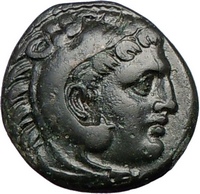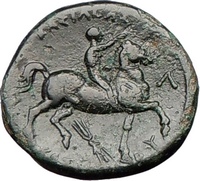Cassander King of Macedonia 305-297 B.C.
Biography & Ancient Coins for Sale for Collecting Pleasure and
Investment
Buy original ancient coins of Cassander online from
trusted ancient coin dealer, Ilya Zlobin. The son of Antipater, Regent
of Macedon appointed by Alexander, Cassander succeeded to the government
of the country of his father's death in 319 B.C. He was notorious for
his cruelty, and in 311 B.C. he executed Alexander's widow Roxana and
her young son Alexander IV. In 305 B.C. he assumed the title of King.
All coins you purchase from his store are professionally researched,
photographed and provided with a lifetime guarantee of authenticity.


Example of Authentic Ancient
Coin of:
Cassander -
Macedonian King: 319-297 B.C.
Bronze Struck circa 319-297 B.C.
Reference: Sear 6754; Price (Coins of the Macedonians) pl. XII, 65
Head of young Hercules right, clad in lion's skin.
ΒΑΣΙΛΕΩΣ / KAΣΣAΝΔΡΟΥ above and beneath naked youth on horse pacing
right.
The son of Antipater, Regent of Macedon appointed by
Alexander, Cassander succeeded to the government of the country of his
father's death in 319 B.C. He was notorious for his cruelty, and in 311
B.C. he executed Alexander's widow Roxana and her young son Alexander
IV. In 305 B.C. he assumed the title of King.
Cassander (Greek/font>:
Κάσσανδρος , Kassandros Antipatros; ca. 350 - 297 BC), King of
Macedonia (305 - 297 BC), was a son of
Antipater, and founder of the
Antipatrid dynasty.
Early
history
Cassander is first recorded as arriving at
Alexander the Great’s court in
Babylon in 323 BC, where he had been
sent by his father, Antipater, likely to help uphold Antipater’s regency
in Macedon, although a later contemporary suggestion hostile to the
Antipatrids was that Cassander had journeyed to poison the King.
Whatever the truth of this suggestion, Cassander
certainly proved to be singularly noted amongst the
diadochi in his hostility to
Alexander‘s memory.
Alexander IV,
Roxanne, and Alexander’s supposed
illegitimate son
Heracles would all be executed on his
orders, and a guarantee to
Olympias to spare her life was not
respected. So too, Cassander would restore
Thebes, which had been destroyed under
Alexander. This gesture was perceived at the time to be a snub to the
deceased King. It was even said that he could not pass a statue of
Alexander without feeling faint. Cassander has been perceived to be
ambitious and unscrupulous, and even members of his own family were
estranged from him.
Later
history
As Antipater grew close to death in 319 BC, he
transferred the regency of Macedon not to Cassander, but to
Polyperchon, possibly so as not to
alarm the other diadochi through an apparent move towards dynastic
ambition, but perhaps also because of Cassander’s own ambitions.
Cassander rejected his father’s decision, and immediately went to court
Antigonus,
Ptolemy and
Lysimachus as allies. Waging war on
Polyperchon, Cassander would destroy his fleet, put Athens under the
control of
Demetrius of Phaleron, and declare
himself Regent in 317 BC. After Olympias’ successful move against
Philip III later in the year, Cassander
would besiege her in
Pydna. When the city fell two years
later, Olympias was killed, and Cassander would have Alexander IV and
Roxanne confined at
Amphipolis.
Cassander associated himself with the
Argead dynasty by marrying Alexander’s
half-sister,
Thessalonica, and had Alexander IV and
Roxanne executed in either 310 BC or the following year. Certainly, in
309, Polyperchon would begin forwarding the claims of
Heracles as the true heir to the
Macedonian inheritance, at which point Cassander bribed him to have the
boy killed. After this, Cassander’s position in Greece and Macedonia was
reasonably secure, and he would proclaim himself King in 305 BC. After
the
Battle of Ipsus in 301 BC, in which
Antigonus was killed, he was undisputed
in his control of Macedonia. However, he had little time to savour the
fact, dying of
dropsy in 297 BC.
Cassander’s dynasty did not live much beyond his
death, with his son
Philip dying of natural causes, and his
other sons
Alexander and
Antipater becoming involved in a
destructive dynastic struggle along with their mother. When Alexander
was ousted as joint king by his brother,
Demetrius I took up Alexander's appeal
for aid and ousted Antipater, killed Alexander, and established the
Antigonid dynasty. The remaining
Antipatrids such as
Antipater Etesias would prove unable to
re-establish the Antipatrids on the throne.
Of more lasting significance was Cassander’s
transformation of
Therma into
Thessalonica, naming the city after his
wife. Cassander also founded
Cassandreia upon the ruins of
Potidaea.
Cassander
as a fictional character
|